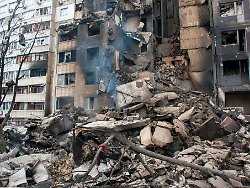Attack on Ukrainian cities
UN: Credible reports of Russian cluster bombs
3/11/2022 5:02 p.m
According to experts, pictures from Ukrainian cities show that cluster munitions were used there by the Russian army. Their use against densely populated residential areas without a military objective is considered a war crime. The United Nations is alarmed.
According to the UN human rights commissioner, it has received credible reports of several cases in which Russian soldiers have used cluster munitions in populated areas in Ukraine. “We remind the Russian authorities that targeted attacks on civilians and civilian objects, so-called carpet bombing in towns and villages and other forms of indiscriminate attacks are prohibited under international law,” said a spokeswoman. It could be a war crime.
Cluster munitions are rockets or bombs that burst while still in the air over the target and release a large number of small explosive devices, the so-called submunitions. These mini-bombs, about the size of a soda can or aerosol can, then fall to the ground within a radius of several tens of meters. They can penetrate even lightly armored vehicles and not only fatally injure people nearby with their fragmentation effects. Cluster munitions can be fired from the ground by rocket launchers, but they can also be dropped as bombs from aircraft.
Experts in conflict research, human rights and weapons science have repeatedly denounced the use of cluster munitions against the Ukrainian population in recent days. Attacks of this type killed several people, including children, according to human rights organizations. “We have to prepare ourselves for terrible suffering,” said Simone Wisotzki from the Hessian Foundation for Peace and Conflict Research. Conflict researcher Wisotzki said in response to statements by Russian Defense Minister Sergei Shoigu that Russia was “only aiming at military objects” and working “exclusively with high-precision weapons”: “Cluster munitions are not precision weapons.”
This type of ammunition is dangerous not only because of its immediate explosive effect and the shrapnel. According to Alan Barlow, the chief technical adviser for Conflict Armament Research, at least 10 percent of the submunitions fail to detonate as intended: “These duds pose a major explosion hazard to nearby people unless they are disarmed.” Cluster bombs are outlawed in most countries around the world. To date, 110 countries have ratified the 2008 Convention against Cluster Munitions, including Germany. The convention prohibits, among other things, the manufacture and use of this type of ammunition. However, Russia and Ukraine did not sign the treaty. According to reports, cluster munitions have also been used in contested areas in Donbass since 2014.
